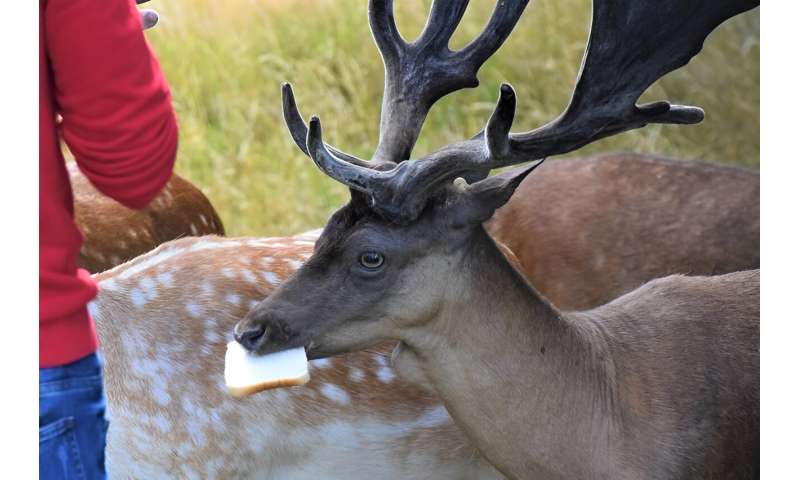Health issues in Phoenix Park deer caused by public feeding

The feeding of deer in Phoenix Park by the public is causing health and behavioral issues, according to research by University College Dublin.
Stags fed by people are developing worse antlers due to low quality food—hurting their chances of getting a mate, while mothers who consistently begged for food are having larger fawns, which could lead to birthing issues.
This is according to Jane Faull, a Ph.D. researcher in behavioral ecology at the UCD Laboratory of Wildlife Ecology and Behavior, who has been studying the deer in Phoenix Park in collaboration with the Office of Public Works (OPW).
Tracking health and behavioral issues in the deer as a result of being fed by people, she found that only a quarter of the deer in the park accept food from people, causing them to be over-fed compared with the rest of their herd.
She told RTÉ's Morning Ireland that this means the majority of deer in Phoenix Park are not comfortable with people getting so close and that approaching them can cause stress behaviors including sudden bolting and the animals packing themselves together too tightly when surrounded by visitors.
"Please don't feed them anything, even if you think it is a good food," she said. "They're not Rudolph. They don't like carrots, it's not good for them."
Recommending that people should try to keep at least 50 meters away from wherever possible, she continued "all of our phones have fantastic camera on them, use that zoom. It's for your own safety really—for them and for you. We don't want people getting to close. We don't want accidents happening."
The researcher added that it is not known what viruses can be passed between humans and deer and this is another reason for people to keep their distance.
Last year, a team from UCD discovered that deer at the Phoenix Park were the first in Europe to be infected with COVID-19, most likely a result of regular human contact.
Feeding the deer at Phoenix Park is prohibited by the OPW, who have launched a "Don't Feed the Deer' campaign in the park supported by the research of Jane and the UCD Laboratory of Wildlife Ecology and Behavior.
The initiative hopes to remind visitors of the impact that can have on the natural behavior of the park's deer herd.
As part of the campaign, the OPW will install educational signage throughout Phoenix Park, highlighting the potential hazards associated with feeding.
"While the allure of these wild creatures is undeniable, it's imperative to recognize that they are precisely that—wild," said Paul McDonnell, Phoenix Park superintendent.
"Feeding them, far from being good for them, inflicts significant stress and harm. Human-deer interactions pose a substantial safety risk, not only to the animals but potentially to ourselves as well.
"The practice of feeding wild deer is perilous to their welfare and must cease immediately. We implore visitors, both locals and tourists alike, to refrain from feeding the deer and to observe their natural behaviors from a respectful distance of at least 50 meters. I would also like to extend my gratitude to University College Dublin for its invaluable research contributions."
Provided by University College Dublin